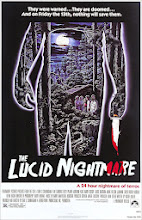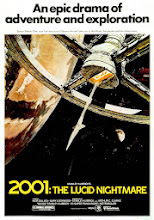Conquest
of Space
Director:
Byron Haskin
Year
1955
Conquest
of Space is a mid-50's sci-fi spectacle which blends science and
religion, into a rather peculiar and interesting concoction which
never ceases to amaze, and above all, entertain. Caught in a
balancing act between the spiritual and the physical, this space
exploration feature is teeming with style and wonder, yet the
filmmakers make painstaking efforts in keeping everything fairly
grounded and simplistic. With its engaging characters and bold
approach, Conquest of Space is a great little disregarded science
fiction gem, which though wholly dated, is still a thought-provoking
and interesting tale, stressing the dangers that mankind must face
when venturing out into the great unknown of space.
On a
space station orbiting Earth, an elite crew of astronauts led by
General Samuel T. Merritt, receive word that they will be heading to
Mars on mankind's first manned voyage to the planet. With aspirations
of goodwill and the prospect of obtaining a greater knowledge for the
human race in each member's mind, they embark into the unexplored. As
they near the planet Mars their mission gradually starts to unravel
due to religious beliefs colliding with their scientific endeavor.
General Merritt begins to have a change of heart as he drastically
comes to the realization that their mission is an insult to God,
forcing him to do everything in his power to halt their sinful
actions, even if it means destroying the crew and any chances of them
making it back home.

Walter
Brooke plays the role of General Samuel T. Merritt, the stressed out
leader of the first voyage to Mars. Brooke is fascinating in the
role, and even though the change in his character's personality is
abrupt and silly, you still believe it because of the man's dedicated
attempts at throwing himself headlong into the character and its
inherent madness. Eric Fleming takes on the role of Captain Barney
Merritt, son of Samuel Merritt, and he becomes the real hero of the
film. Left to pick up the pieces of his father's work, Barney has
always reluctantly hurled himself out into space, because of the
wishes of his father, and as this unwilling participant, Barney comes
to find that he fits the mold of space explorer better than his
father ever could. I enjoyed Fleming's approach to the character and
out of the entire cast, his was the most endearing and contemporary.
On the
other side of that acting coin comes Phil Foster as Jackie Siegle,
the bumbling comic relief. Sticking out like a soar thumb, Foster's
overacting is a ridiculous distraction that derails the film's somber
atmosphere on more than one occasion, but in all intensive purposes
serves to give way to some especially jovial scenes that are quaint
given the circumstances. Another odd ball of the bunch is Mickey
Shaughnessy as he takes on the role of Sergeant Mahoney, the
ridiculously dedicated friend of General Samuel T. Merritt. For me,
Shaughnessy's character was the most infuriating of the bunch as he
always condemned and threatened anyone who would go against the
General's orders, even if that person was the General's own son who
literally didn't want anything to do with a life in space, but to
rather live out his own life on Earth with his wife. Mahoney even
goes as far as to call him an ungrateful little brat just because he
didn't want to live his life the way his father intended him to.
These moments, though far-fetched at present time, are endearing to
see play out on film in this fifties-centric sci-fi romp and the fact
that this character irritated me so much actually allowed me to
appreciate this production that much more for having a cast as
diverse as it did and to move me the way that it managed to.

The
story is equally intriguing, not only because it depicts an
exploration to an uncharted planet, but because of the religious
implications that such an act can bring to a society that still
believes that we are slaves to a higher being, ones who are meant to
know our place in the world and never seek knowledge beyond our
boundaries. The idea of encroaching on God's domain is a captivating
one and it is a concept that the film absolutely nails. You can see
the madness in General Merritt's eyes as he realizes this unholy of
sins and the measures that he goes to bring the mission down are
startlingly harsh and deadly in execution. Needless to say the
severity level of this film comes out of left field and when it does
it changes the entire tone of the film, and for the better. I've seen
plenty of films that depict the mental chaos that space travel can
bring about, but Conquest of Space is probably the most effective due
to its playful, tongue and cheek nature during the opening third of
its runtime and the drastic turn it all takes in the second and third
acts of the film.
Of
course you can't have a science fiction film, especially a George Pal
produced flick, without mentioning the special effects. When it comes
to Conquest of Space, the visual elements that bring this movie
together are exceptionally creative and inevitably entertaining. In
modern terms and by current cinema standards, the effects might
appear mundane and childish, but in my classic cinema loving eyes the
model work is exquisitely charming and especially appreciated.
There's just something magical about this kind of practical effects
approach that just speaks louder than any computer-generated,
overblown, effects laden extravaganza ever could, which modern
blockbusters regurgitate out on a regular basis nowadays. For that
alone, Conquest of Space earns my respect and admiration, even if it
is a bit nutty.

Conquest
of Space is an unusual and highly addictive space yarn which merges
the ideas of space exploration and religion, forcing it into some
rather shocking and unexpected territories. What starts off as a
comedy/adventure hybrid, soon turns into a desperate tale of
blasphemy and betrayal as a group of astronauts fight to survive
amidst a savage and uncharted environment. Composed around a father
and son's turbulent relationship and juxtaposed against the
generational gap that separates them because of beliefs and lifestyle
choices, the initially simple narrative soon becomes something of an
allegory for the clashing of mankind's beliefs and the turmoil we set
upon ourselves when proving that our truth is infallible.
Walter
Brooke and Eric Fleming do an amazing job in portraying the father
and son of the story and the tension between each actor is extremely
accomplished. Phil Foster and Mickey Shaughnessy also do their part
in shaking up the story with their polar opposite personalities, that
perfectly reflect the bi-polar nature of the picture with its
conflicting ways and confounding beliefs. Toppled with that the
lovingly crafted practical effects of the film and you've got
yourself one damn interesting production that has something to say
and boldly throws it all in your face for you to determine and take
sides. For me, this is what science fiction is all about. It's about
wild ideas that challenge us both physically and mentally, not the
overblown effects laden tent-pole films of modern times. Conquest of
Space allows for its story to take center stage as it plays with the
notion of men becoming gods and whether that is a good thing, a bad
thing, or just an inevitability. Intriguing to say the least. This is
one film that is.....

 |
| Everybody dig in! |
 |
| Well hello there Jackie Baby. |
 |
| A bunch of wise-guys huh. |
 |
| Weeeeeeee! |
 |
| This just in..... This film is nuts! |
 |
| Pull my finger Mister or I'm gonna pop you one! |
 |
| Ludicrous speed...... GO! |
 |
| Sweet moves Maverick! |
 |
| Get down here you knuckle-head. |
 |
| Shit! I said a Philips Head Space Screwdriver not a Flat Head! |
 |
| In space... No one can hear you sing opera. |
 |
| I outta give you a knuckle-sandwich. |
 |
| Are we supposed to be on fire right now?!?!?! |
 |
| You guys are as graceful as a comet. |
 |
| According to Sgt. Mahoney, there's never a wrong time to grab someone's ass. |
 |
| Well it's a fact gentlemen..... Mars sucks. |
 |
| Merry Christmas from Mars. |
 |
| Like this movie or I'll bust a cap in your ass! |
















































































































That's a pretty good review. As someone who enjoyed this movie I found it interesting to read your analysis, especially the analysis of the conflict between science and religion.
ReplyDeleteIf it's of any interest, I have taken a shot at reviewing the movie myself. It's certainly quite a bit different (though I might have used some of the same pictures).
http://hitchcocksworld.blogspot.ca/2014/01/between-1950-and-1953-american-producer.html